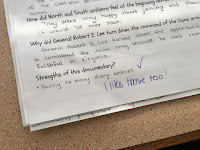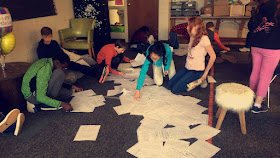OH, the Humanities! ... the adventures of a middle school humanities teacher ...
Sunday, March 18, 2018
A Soldier's Life for Me
As we delve into the Civil War, we have been analyzing what life was like for soldiers during the Civil War through many different activities. First, we began our novel study on "Soldier's Heart" by Gary Paulson. Through this piece of historical fiction, which is based on a real character, Charley Goddard, we see the horrors of war through the eyes of a 15 year old. We studied characterization, setting, plot elements, figurative language, theme, and created higher order thinking questions to spur discussion in small groups.
We researched the involvement of Irish immigrants and their role during the Civil War on both the Union and Confederate sides. Using a unique primary source, Irish music and lyrics, we learned about what life was like for soldier's on the battle field as well as the long days at camp. Great songs to study include "Irish Volunteer" "Boys in Blue" "Paddy's Lamentation". Recognizing the importance of music to humans throughout time, students then created a "modern playlist" for different characters during the Civil War. You snag this great activity from High Mountain History HERE on tpt.
**Using electronic devices and headphones in the classroom went down as a win for the kids :)
To learn more about everyday life, students role-played as Civil War soldier. Part of the game was choice, part of the game was luck. This AMAZING game can be purchased from Brainy Apples HERE on tpt.
This game allowed students to realize that a soldier's life consisted mainly of waiting in camp for the next battle. During this time, soldiers had different methods of helping keep the boredom at bay including singing, whittling, gambling/smoking/drinking, patrolling, "Farming" for food and supplies in local towns, writing letters, and getting SICK. Over half of the casualties from the Civil War came from infection and sickness than they did from combat.
Writing letters was not only important for the soldier's and their families during the war, it is also one of the reasons that we know so much about the war today. We annotated one of the most famous, AND MY FAVORITE! Civil War letters, written by Sullivan Balou to his wife. Afterward, students got into character and wrote a letter home to either a sweetheart, wife/husband, son/daughter, mom/dad. For a great letter activity check out Instructomania's lesson HERE on tpt.
I was SO proud of these 7th and 8th grade kiddos, they really took these characters to heart and wrote beautiful words! Teacher heart full.
Monday, February 19, 2018
Murderer or Deliverer? YOU DECIDE.

Essential Question: Why does authorship matter in primary and secondary sources?It is important to teach people to question what is believed about events in history and in the news today. Why do we believe what we believe? Because historians interpreted the evidence certain ways. So, why not, with events that get one or two lines in history textbooks, allow students to do a little interpreting of their own. Nat Turner and John Brown allow students to see that much of the American story can be learned, not just from those who were on the winning side, but those who were considered criminals, dissidents, and troublemakers. I want kids to question textbooks, websites, and source authorities. History is alive, debatable, and connected to the present in lingering ways. This activity was adapted from a lesson idea from the incredible book "Why Won't You Just Tell Us the Answer" By Bruce A. Lesh. He is an incredible author who redefines teaching history and focuses on students asking questions, analyzing evidence, and developing historical explanations of their own.
 To begin, students were confronted with a series of images of Nat Turner and John Brown. These images range from contemporary to primary sources. As each image was displayed and passed around the groups, students were asked to describe how the character and their actions are being depicted by the author. After looking at 5 or 6 images, students start piecing together that this may be one event, one specific guy maybe? I confirmed that each one is showing antebellum slave revolts and that the two characters depicted are Nat Turner (1831) and John Brown (1851), both leaders of fatal slave rebellions.
To begin, students were confronted with a series of images of Nat Turner and John Brown. These images range from contemporary to primary sources. As each image was displayed and passed around the groups, students were asked to describe how the character and their actions are being depicted by the author. After looking at 5 or 6 images, students start piecing together that this may be one event, one specific guy maybe? I confirmed that each one is showing antebellum slave revolts and that the two characters depicted are Nat Turner (1831) and John Brown (1851), both leaders of fatal slave rebellions.WHY WOULD WE GET SUCH DIFFERENT VIEWS OF THEM?
The final assessment was to create a historical marker for either John Brown's Harper's Ferry Raid or Nat Turner's rebellion. They needed to share THEIR interpretation of either Nat Turner or John Brown and their actions.
Causes of the Civil War
Another Vocabulary review activity that is SUPER simple but requires student thought, opinion, analyzing, and reflection.
Much of what we have been studying has been building to the Civil War. Wars never start because of one, isolated incident or issue, they are a result of building bitterness and resentment. Today, we reviewed the different events we have been studying:
Missouri Compromise of 1820
Kansas-Nebraska Act of 1850 ("Bleeding Kansas")
Lincoln-Douglas Debates (1859)
John Brown's Raid / Nat Turner's Slave rebellion
Harriet Beecher Stowe's narrative "Uncle Tom's Cabin"
Fugitive Slave Laws
Dred Scott Supreme Court Discussion
Lincoln's inaguration in 1860
The kids worked together in groups to order these events in order from "most significant" and "least significant" in causing the Civil War. It was interesting to see their different opinions on what they felt would have been the straw that broke the camels back. That is the really cool thing about history, it is all about interpretation, we all view issues differently.
If you are interested in these review cards, they are available, with the reflection sheet, HERE at my TPT store.
After working as a group, students had the opportunity to reflect on which event they felt, personally, had the greatest impact and why.
We then watched a 30 minute clip from THE Civil War documentary - Ken Burns "The Civil War" concerning the causes of the Civil War. Students answered some video reflection questions, then analyzed the information presented by sharing strengths and weaknesses that they saw in the film.
Monday, February 12, 2018
To Persuade or Not to Persuade?
We did a pretty long persuasive unit recently.
First, we wrote to persuade, arguing the pros and cons of video games, particularly pertaining to violence in society. While researching, we utilized the I.C.E method in our body paragraphs, Introducing our reason, Citing textual evidence from our research, and Explaining or giving Examples from our own experiences to support our argument.
The year is 1840, and the issues on the table include: *The annexation of Texas and potential war with Mexico and Spain*Slavery being permitted in western states being added to the Union. *The spreading of American "culture" across the country - particularly to the Native Americans*Is Westward Expansion Constitutional
People born in the modern, "already have the knowledge of the destruction and racism that will come", politically correct era of 2017, ALL tend to side on the negative bias of Manifest Destiny. To our modern ears, the idea of conquering lands and people sounds ludicrous and the next theme for another Avatar movie. However, in debate (of which I was apart of competitivly for 3 years) it is simply a flip of the coin to see which side you will fight for. As I shared with the kids, it can be quite a fun challenge to find evidence and argue for something you don't agree with and really hones in your debating skills. And, of course, the kids rose to the challenge - we were at it for about a week, while practicing for the big event, the kids did an excellent job defending their side. They prepared statistics, jabs to give their opponents, and prepared rebuttals to share in response.
First, we wrote to persuade, arguing the pros and cons of video games, particularly pertaining to violence in society. While researching, we utilized the I.C.E method in our body paragraphs, Introducing our reason, Citing textual evidence from our research, and Explaining or giving Examples from our own experiences to support our argument.
My essay of the week packet is available HERE on TPT.
Next, we looked at commercials and advertisements, looking at how producer try and persuade consumers. Using our knowledge of persuasive techniques, students analyzed Super Bowl Commercials.
**This is what happens when I am too lazy to pass things out! LOL. Anyone else do this? Does this make me a terrible person?
To wrap it all up, we staged our biggest persuasive project yet- a classroom DEBATE! Students worked hard in their teams to create arguments, collect research, and form strong persuasive speeches concerning the motion.
Our Motion (or resolve) is on Manifest Destiny, our current history unit, and whether the United States had the right to Westward Expansion. The year is 1840, and the issues on the table include: *The annexation of Texas and potential war with Mexico and Spain*Slavery being permitted in western states being added to the Union. *The spreading of American "culture" across the country - particularly to the Native Americans*Is Westward Expansion Constitutional
People born in the modern, "already have the knowledge of the destruction and racism that will come", politically correct era of 2017, ALL tend to side on the negative bias of Manifest Destiny. To our modern ears, the idea of conquering lands and people sounds ludicrous and the next theme for another Avatar movie. However, in debate (of which I was apart of competitivly for 3 years) it is simply a flip of the coin to see which side you will fight for. As I shared with the kids, it can be quite a fun challenge to find evidence and argue for something you don't agree with and really hones in your debating skills. And, of course, the kids rose to the challenge - we were at it for about a week, while practicing for the big event, the kids did an excellent job defending their side. They prepared statistics, jabs to give their opponents, and prepared rebuttals to share in response.
Saturday, February 10, 2018
$20 and the Indian Removal Act
What do the above items have to do with each other?
Andrew Jackson.
7th President of the United States.
Hero of the Battle of New Orleans during the War of 1812.
President of the "Common Man"
Leader of the war against "big banks"
... and law maker of the "Indian Removal Act".
So, how should Americans remember the 7th president of the United States of America?
Well, my middle schoolers can tell you ... but they don't all agree ... And that makes my teacher heart very happy :)
This week, studied the Cherokee "Trail of Tears" which embodies the Indian Removal Act at work. Students came to their personal conclusions about how to remember Andrew Jackson after analyzing different sources including Andrew Jackson's speech to Congress concerning the "Indian Problem", the true testimony of a soldier, John Burnett, who assisted in the actual removal, and a non-fiction "textbook-like" factual source.
Students summarized their sources views, illustrated the Trail of Tears, and summarized the event objectively.
Finally, they wrote 5 paragraph, persuasive essays, debating whether Jackson should or should not remain on the $20 dollar bill. Click HERE For my 5 paragraph essay packet on TPT.



















































